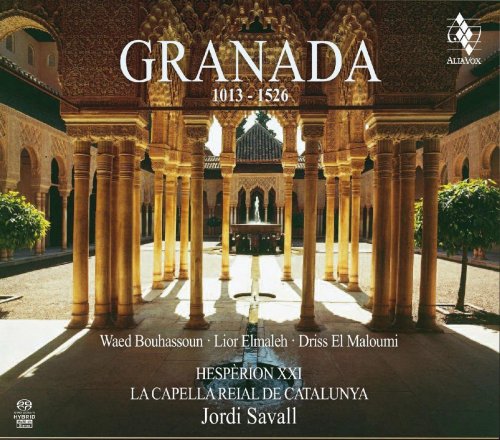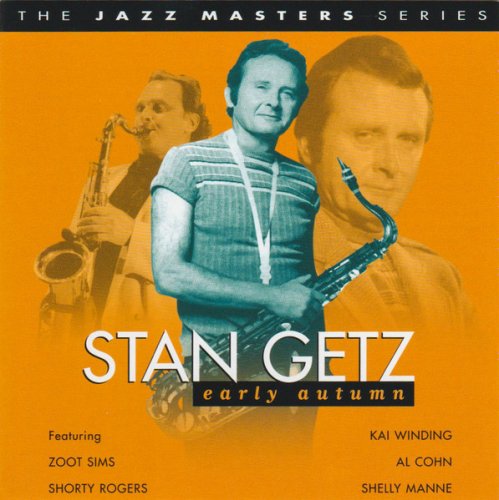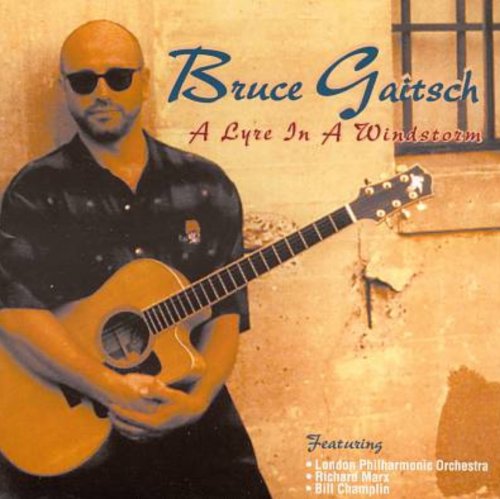Jordi Savall - Granada 1013 - 1526 (2016) [SACD]

Artist: Jordi Savall
Title: Granada 1013 - 1526
Year Of Release: 2016
Label: Alia Vox
Genre: Classical
Quality: DSD64 image (*.iso) / 2.0, 5.0 (2,8 MHz/1 Bit)
Total Time: 01:18:39
Total Size: 3.59 GB
WebSite: Album Preview
Tracklist:Title: Granada 1013 - 1526
Year Of Release: 2016
Label: Alia Vox
Genre: Classical
Quality: DSD64 image (*.iso) / 2.0, 5.0 (2,8 MHz/1 Bit)
Total Time: 01:18:39
Total Size: 3.59 GB
WebSite: Album Preview
I. ÉPOCA ZIRÍ (1013)
01. Invocación: Qamti be-Ishon Layla ( Lior Elmaleh) 2:30
02. Taksim & danza morisca (instr.) (Ney) 2:11
II. ÉPOCA BEREBER: LOS ALMORÁVIDES (1090)
03. Moaxaja: Billadi askara min aadbi Llama – Al-Andalus (D. El Maloumi & W. Bouhassoun) 4:12
04. Preces: Penitentes orate – Plegaria mozárabe s. XI (La Capella Reial de Catalunya) 3:44
05. Ductia (instr.) – Cantiga de Santa María 123 – Alfonso X El Sabio 2:05
06. Siónida: Yefe Nof – Yehudá Haleví (L. Elmaleh) 4:52
III. ÉPOCA ALMOHADE (1144)
07. Taksim (Kanun). Moaxaja: Ya gosan naqa – Ibn Zuhr, Al-Ándalus (W. Bouhassoun) 2:46
08. Carta conversión [Recit.] Las Estrellas de los cielos (instr.) – Anón. sefardí 3:16
09. Danza morisca (instrumental) 1:50
10. Lamento: Plange Castella misera – Códice de Las Huelgas, Anónimo s. X (M. Mauillon) 3:57
11. Danza de iniciación (instrumental) 2:52
12. Lamento árabo-andaluz Dror yiqrá (W. Bouhassoun & L. Elmaleh) 4:36
IV. ÉPOCA NAZARÍ (1238)
13. Poema en piedra de la Alhambra de Granada. [Recitado] (M. Forcano). Taqsim (instr.) 2:13
14. Pero que seja a gente – Cantiga de Santa María 181 (La Capella Reial de Catalunya) 4:29
15. Romance fronterizo: Cerco de Baeza – Anónimo (CMP 106) 4:05
V. LA DINASTÍA DE LOS MUHAMMAD (1362)
16. Lamento: El camino – La angustia – Improvisación andalusí (W. Bouhassoun) 3:23
17. Propiñan del Melyor (instr.) – Anónimo, s. XV 1:17
18. Villancico: Aquella mora garrida – Gabriel (CMP 254) (La Capella Reial de Catalunya) 3:22
VI. FIN DEL REINO NAZARÍ DE GRANADA (1492)
19. Villancico: Viva el gran Re Don Fernando – Carlo Verardi (La Capella Reial de Catalunya) 4:05
20. Romance: El pan de la aflicción – Plegaria sefardí (La Capella Reial de Catalunya & L. Elmaleh) 4:08
21. Diario de abordo de Cristóbal Colón [Recitado] (M. Forcano). Flauta india (instr.) 2:40
VII. DOMINIO CASTELLANO (1502)
22. Villancico: Todos los bienes del mundo – Juan del Enzina (La Capella Reial de Catalunya) 2:28
23. Crónica de los Reyes de Castilla [Recitado] (M. Forcano) 1:50
24. Lamento andalusí Maqam hijaz – Ibn Zaydún (W. Bouhassoun & L. Elmaleh) 5:41
With this release, Jordi Savall treats us to another of the great cultural explorations that he does so brilliantly and for which he is so famous. This time, he puts under the microscope the great cultural melting point of the kingdom of Granada. Now part of southern Spain, Granada was the last part of Spain to be held by the Moors before the Christian reconquest in 1492: a red letter year for Spain, indeed, considering that this is the same year that Columbus set out from Barcelona for the New World (though, less happily, it also saw the expulsion of Spain’s Jews). The kingdom was known for its juxtaposition of three cultures: Muslims, Jews and Christians who, at various times, lived together in relative harmony. This disc explores that interaction, though in a booklet essay one of the academic consultants for the project explains why this is a “fallacy”, arguing that it was convenience rather than harmony that kept the three together. Exploring this interaction is exactly what Savall does so brilliantly – it might even be his life’s work – as can be seen in his previous projects like Jerusalem, the City of two Peaces or Mare Nostrum about the east/west interactions via the Mediterranean Sea, to name but two. Like them, this disc comes with a fabulous booklet (280 pages!) in six languages, including English, which include lavish illustrations, full sung texts and translations, together with academic essays which are both highly informed and accessible. The music itself is packed full of discoveries and treasures which often reveal themselves through juxtaposition. The first track, for example, is a Hebrew invocation, based on the Song of Songs, its eerie melismas and guttural vowels having the power to transport the listener right from the off. Immediately afterwards follows an instrumental to commemorate the Muslim defeat of the Christian king Alfonso VI of Castile in 1086, so immediately we have the juxtaposition of Jewish, Christian and Islamic cultures that made the kingdom of Granada so special, almost unique. The Latin prayers of the Mozarabs, Christians who lived under Moorish rule, seem redolent with loss and yearning, and then the instrumental commemorating the Cid’s reconquest of Granada has the energy and rhythmic power of a vibrant dance. All of the instrumentals, in fact, are played by experts and seem to speak of a whole world that I, for one, feel I know almost nothing of but which I am now keen to explore. The very nature of the kingdom’s history means that celebrations sit alongside laments and, exciting as the celebratory moments are, it is the many passages of mourning that will stay with me the most, be it lament for the death of King Sancho III of Castile, a haunting melisma over a delicately moving string line, or the Sephardic lament over the battle of Las Navas de Tolosa. Those laments even seem to infect many of the brighter moments. The choral work is also typically excellent, and I especially enjoyed the Frontier Ballad that commemorates the Siege of Baeza, full of rhythmic lilt and airy musical line. There are even several poems that are recited alongside suitable music, the most effective of these being Ibn Zamrak’s address to the Alhambra, “a poem in stone.”. The final section is particularly interesting, and historically honest. It begins with a joyous acclamation of Ferdinand and Isabella to commemorate the “liberation” of Granada from the Moors, but there follows a heartfelt lament from the expelled Jews. The celebrations for the birth of Charles V are then offset by a desperate Andalusi lament to commemorate the forced conversion of all Granada’s Muslims in 1502. The tracks are structured chronologically so that Savall leads us through the whole epoch from Zirid’s founding of the kingdom in 1013 through each dynasty, through to the kingdom’s incorporation into Castile in 1492 and, as a poignant end point, the forced conversion of all Granada’s Muslims in 1502. In short, this is a breathtaking achievement. It’s the kind of disc that often left me in quiet astonishment not just at its ambition, artistry or skill, but at the way it tries to further the human story and enrich the experience of us all. Bravo!
Simon Thompson – musicweb-international.com
This historical and musical evocation of five centuries in the life of one of the most important and admired cities in Muslim Andalusia takes as its inspiration and starting-point the founding in 1013 of the kingdom of Granada by Zawi ibn Zirid on the ancient site of Garnata al-Yahud, or “Granada of the Jews”. Specially commissioned by the Granada Festival of Music and Dance, this programme was conceived and created to celebrate the millenary of the founding of the Kingdom of Granada. Most of the music on this SACD was performed and recorded live during the concert given on 1st July 2013 at the Palace of Charles V in the Alhambra.
On his new theme album, named after Granada – the city that epitomised Muslim rule in Spain and also witnessed its last stand – Jordi Savall continues his search for traces of cultures that lived around the Mediterranean in Medieval times. The album sees the return of regular guest soloists Waed Bouhassoun from Syria, Lior Elmaleh, a Moroccan-Jewish Israeli, and Driss El Maloumi, who is Berber-Moroccan. Arranged in historical order, the pieces on the album illustrate the rise and fall of the kingdom of Granada, as well as the cultures that coexist there – Muslim, Christian, Jewish – which had complicated relations at times, but also fertilised each other. The album contains a version of ‘Lama Bada Yatathana’, a classic that made its way to the Levant, and which is still popular there. Featuring the beguiling voice of Bouhassoun, supported by El Maloumi, the song sounds as fresh as ever. A few tracks further on, Elmaleh sings a moving Jewish Arab-Andalus lament about Jewish suffering, in which he is joined by Bouhassoun, with the outstanding Syrian flute virtuoso, Syrian Moslem Rahal, contributing a heartrending solo. The song ‘Pero que Seja a Gente’ is another old favourite, attributed to King Alfonso the Wise, an early Roman-Catholic king of Toledo, a fierce conqueror of Muslim rule who, meanwhile, fostered an orchestra at his court with Christian, Jewish and Muslim musicians. The song is about two warring Moroccan Muslim kings who were engaged in an undecided battle, until one invoked Saint Mary, and won. The all-inclusive moral being that the Holy Virgin even helps disbelievers who call for her. The less idyllic reality sets in with ‘Viva el Gran Re Don Fernando’, an ode to King Ferdinand, who along with his wife Isabella finalised the Christian conquest of all of Spain in 1492, initiating a cruel persecution of Muslims and Jews. That year was also when Columbus left to ‘discover’ the Americas, and ‘Diario de Abordo de Cristóbal Colón’ is a track based on a diary found on board his ship. The last track, ‘Lamento Andalusí’, from a text by the great Arab-Andalus 11th-century poet Ibn Zaydún, is dedicated to the fate of the Iberian Muslims. Here Bouhassoun and Elmaleh sing their hearts out, marking the sense of loss as a main emotional theme of the album.
Simon Thompson – musicweb-international.com
This historical and musical evocation of five centuries in the life of one of the most important and admired cities in Muslim Andalusia takes as its inspiration and starting-point the founding in 1013 of the kingdom of Granada by Zawi ibn Zirid on the ancient site of Garnata al-Yahud, or “Granada of the Jews”. Specially commissioned by the Granada Festival of Music and Dance, this programme was conceived and created to celebrate the millenary of the founding of the Kingdom of Granada. Most of the music on this SACD was performed and recorded live during the concert given on 1st July 2013 at the Palace of Charles V in the Alhambra.
On his new theme album, named after Granada – the city that epitomised Muslim rule in Spain and also witnessed its last stand – Jordi Savall continues his search for traces of cultures that lived around the Mediterranean in Medieval times. The album sees the return of regular guest soloists Waed Bouhassoun from Syria, Lior Elmaleh, a Moroccan-Jewish Israeli, and Driss El Maloumi, who is Berber-Moroccan. Arranged in historical order, the pieces on the album illustrate the rise and fall of the kingdom of Granada, as well as the cultures that coexist there – Muslim, Christian, Jewish – which had complicated relations at times, but also fertilised each other. The album contains a version of ‘Lama Bada Yatathana’, a classic that made its way to the Levant, and which is still popular there. Featuring the beguiling voice of Bouhassoun, supported by El Maloumi, the song sounds as fresh as ever. A few tracks further on, Elmaleh sings a moving Jewish Arab-Andalus lament about Jewish suffering, in which he is joined by Bouhassoun, with the outstanding Syrian flute virtuoso, Syrian Moslem Rahal, contributing a heartrending solo. The song ‘Pero que Seja a Gente’ is another old favourite, attributed to King Alfonso the Wise, an early Roman-Catholic king of Toledo, a fierce conqueror of Muslim rule who, meanwhile, fostered an orchestra at his court with Christian, Jewish and Muslim musicians. The song is about two warring Moroccan Muslim kings who were engaged in an undecided battle, until one invoked Saint Mary, and won. The all-inclusive moral being that the Holy Virgin even helps disbelievers who call for her. The less idyllic reality sets in with ‘Viva el Gran Re Don Fernando’, an ode to King Ferdinand, who along with his wife Isabella finalised the Christian conquest of all of Spain in 1492, initiating a cruel persecution of Muslims and Jews. That year was also when Columbus left to ‘discover’ the Americas, and ‘Diario de Abordo de Cristóbal Colón’ is a track based on a diary found on board his ship. The last track, ‘Lamento Andalusí’, from a text by the great Arab-Andalus 11th-century poet Ibn Zaydún, is dedicated to the fate of the Iberian Muslims. Here Bouhassoun and Elmaleh sing their hearts out, marking the sense of loss as a main emotional theme of the album.
![Jordi Savall - Granada 1013 - 1526 (2016) [SACD]](https://www.dibpic.com/uploads/posts/2021-08/1628222714_back.jpg)
Download Link Isra.Cloud
Jordi Savall - Granada 1013 - 1526 (2016) part1.
Jordi Savall - Granada 1013 - 1526 (2016) part2.
My blog
Jordi Savall - Granada 1013 - 1526 (2016) part1.
Jordi Savall - Granada 1013 - 1526 (2016) part2.
My blog
![Henry Threadgill, Ensemble Double Up - Old Locks and Irregular Verbs (2016) [Hi-Res] Henry Threadgill, Ensemble Double Up - Old Locks and Irregular Verbs (2016) [Hi-Res]](https://img.israbox.com/img/2026-01/11/p30x0pecr83e6f3do67qdh3yo.jpg)






![Steve Davis - Eloquence (2009) [CDRip] Steve Davis - Eloquence (2009) [CDRip]](https://www.dibpic.com/uploads/posts/2026-01/1767988739_6.jpg)
